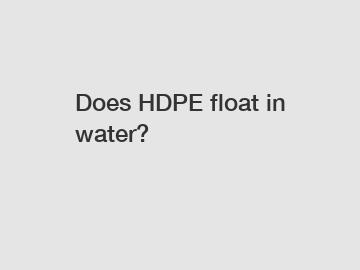Does HDPE float in water?
Does HDPE Float in Water?
High-density polyethylene, commonly known as HDPE, is a versatile and widely used thermoplastic. It is employed in countless applications due to its exceptional strength, durability, and resistance to chemicals. One question that often arises when discussing HDPE is whether it floats in water. To answer this query, we need to delve into the properties of HDPE and explore its behavior when exposed to water. So, let's dive in!
1. The Density Factor:

In order to determine if HDPE floats in water, we need to examine its density. Density is the mass of a substance per unit volume and plays a significant role in determining buoyancy. HDPE boasts a relatively low density of around 0.93-0.97 g/cm³, which is less than that of water (1 g/cm³). This means that HDPE is less dense than water and, according to the principles of buoyancy, it should float.
2. The Water Repellent Nature of HDPE:
Another factor that contributes to HDPE's buoyancy is its excellent water repellent properties. HDPE is hydrophobic, meaning it repels water and does not readily absorb moisture. This hydrophobic nature helps HDPE resist water penetration, ultimately allowing it to remain buoyant on the water's surface.
3. Structural Integrity:
HDPE's ability to float is also influenced by its structural integrity. HDPE is known for its exceptional strength and durability, even when exposed to harsh environmental conditions. Its molecular structure provides resistance to moisture, which further enhances its buoyancy.
4. Practical Examples:
To reinforce our findings, we can look to real-life examples where HDPE is used in applications that require buoyancy. One prime example is the use of HDPE in the production of floating docks. These docks are designed to remain on the surface of the water and provide a stable platform for various activities. The buoyancy of HDPE ensures that the docks stay afloat, even when subjected to considerable weight and pressure.
5. Enhancing Buoyancy with Fillers:
While HDPE itself is naturally buoyant, its buoyancy can be further increased by incorporating fillers. By adding specific types of fillers, such as foam beads or hollow glass spheres, the density of the HDPE can be reduced, making it even more buoyant. This modification is commonly employed in applications where maximum buoyancy is required, such as in the production of life jackets or floating buoys.
6. Limitations and Considerations:
Despite its inherent buoyancy, there are factors that can affect HDPE's ability to float. Firstly, the size and shape of the HDPE object can impact its buoyancy. Large or irregularly shaped objects may displace more water and lose buoyancy. Additionally, factors like temperature, salinity, and material degradation can influence the floating behavior of HDPE. Over time, exposure to sunlight, chemicals, or extreme temperatures can deteriorate the material and potentially compromise its buoyancy.
In conclusion, HDPE does indeed float in water. Its low density, water-repellent properties, and structural integrity enable it to remain buoyant on the water's surface. Whether in the form of floating docks, life jackets, or other applications, HDPE demonstrates its excellent buoyancy. Nonetheless, it is crucial to consider various factors and potential limitations that may affect HDPE's floating behavior. HDPE's ability to float opens up countless possibilities for its applications in water-related industries, making it a valuable and versatile material.
Contact us to discuss your requirements of dredge pipe, mdpe piping, used hdpe pipe for sale. Our experienced sales team can help you identify the options that best suit your needs.
40
0
0

Comments
All Comments (0)